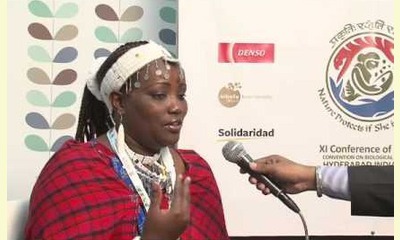|
|
Meet the Tanzanian Woman Who Said No to a Forced Marriage
un article par UN Women, reprinted by Care2
I am one among nearly 50 children of my father, who
has six wives. For none of them was he their
choice. Men come to my father with rings that act
as a booking for a wife, just like they go to any
Maasai elder who has or expects daughters.

click on photo to enlarge
I was no different. The booking had been done even
before my birth. I got to go to primary school by
accident, because I was enrolled in my father’s
absence. That became the gateway for me to go to a
secondary school that opened the year I was
finishing primary school by the Lutheran Church in
Tanzania, in partnership with the NGO Operation
Bootstrap Africa in Minnesota and the Lutheran
Church in the United States of America.
My father was not happy. Going to secondary school
meant delaying marriage, and the cows he would get
as a bride price. He started talking about
marriage whenever I went home for a holiday. I
told him I was still in school and that I did not
want to get married. He brought six different men
to meet me.
I saw my sisters married off at a very tender age
– as young as 10 years old. But with time, in
school I learned that I had the right to choose my
husband and get married whenever I am ready. I
stood up to my father and said NO. I will not be
married to a man you choose but the one I choose
for myself.
My fight had consequences for me socially, as I was
perceived as an outcast. There were even more
consequences for my mother, who was accused of
being the mastermind behind my marriage refusal
when in fact she had nothing to do with it.
The things I went through and the pain and
suffering I saw my late mother go through are what
give me the strength and courage to do what I do
today.
I have been working for women’s rights since I
graduated from high school in 2003, I have been
addressing issues like female genital mutilation
(FGM), forced early marriages, sexual and
reproductive health education, children’s rights,
HIV/AIDS as well as women’s rights to property
ownership and decision-making.
I provide training and educate girls in secondary
schools on sexual and reproductive health as well
as the effects of FGM. I also raise awareness
among men on the rights of women and children, in
the hopes of achieving communities that treat
women and children justly and with the respect
they deserve as human beings.
I want women from my community and other
communities in Tanzania to know their rights.
Every injustice that happens to women in my
community has a cultural argument to support and
to justify it. I believe God has given me the
opportunity to see that there is an alternative
and a chance to change and leave behind oppressive
traditions and hold onto the ones that everyone in
the community can celebrate.
(This article is continued in the discussionboard)
|








|
DISCUSSION
Il n'y pas encore de question liée à cet article.
* * * * *
Commentaire le plus récent:
(The following is continued from the main article listed above.)
My greatest hope is that one day men and women of my Maasai community will join hands together, respecting each other and raising generations of boys and girls that treat one another with love, integrity and dignity.
I want to see a peaceful world, with no struggle for equality because it has been achieved; a world where boys and girls from different backgrounds love and respect each other; a world where everyone’s opinion counts.
Martha Ntoipo is a 33-year-old Maasai activist from Tanzania. She works for the Pastoralist Information and Development Organization (PIDO), a community development organization which she founded in 2010, which works in the fields of health, women economic empowerment, gender equality and human rights, environmental conservation and research.
[Thank you to Janet Hudgins, the CPNN reporter for this article.]

|
|









